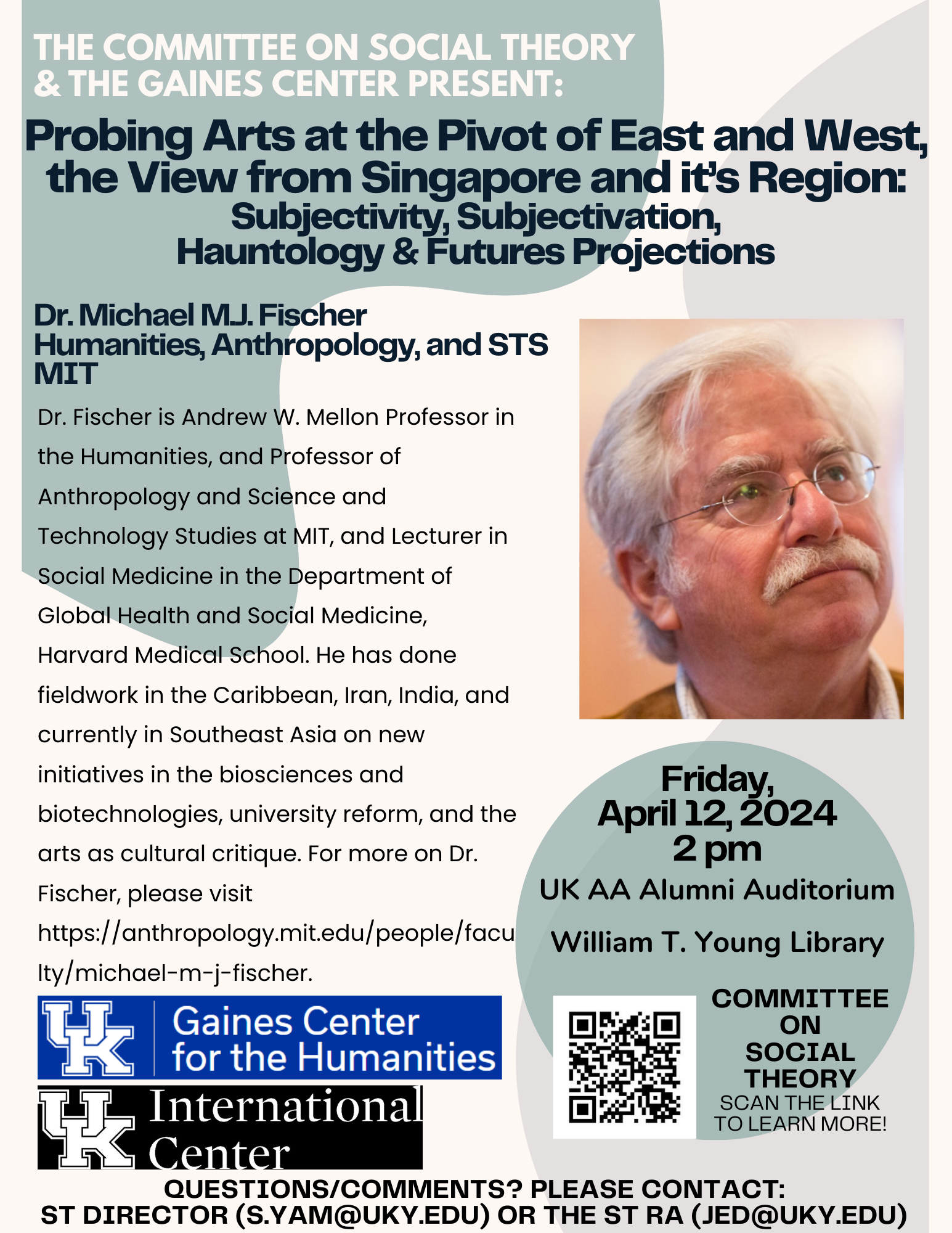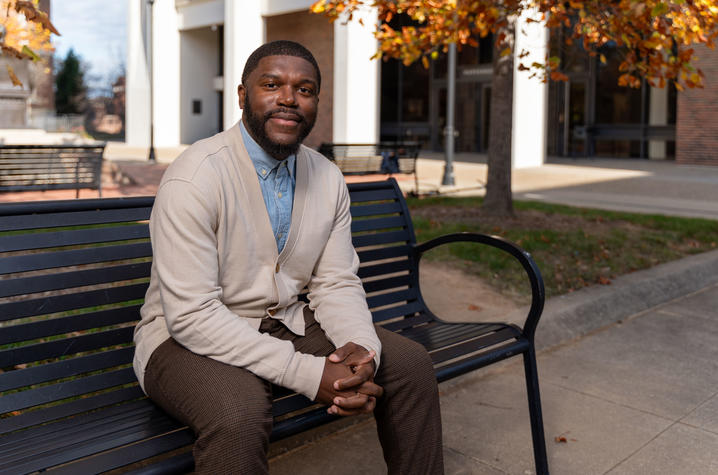CANCELED: Probing Arts at the Pivot of East and West, the View from Singapore and its Region: Subjectivity, Subjectivation, Hauntology & Futures Projections
THIS EVENT HAS BEEN CANCELED DUE TO A MEDICAL CHALLENGE
Please join the Committee on Social Theory for the third speaker in our Spring 2024 Speaker Series on the theme of Global Asias happening on Friday, April 12 at 2 pm ET in the UKAA Auditorium in the William T. Young Library with Dr. Michael M.J. Fischer!
This series will be featuring guest speakers engaging with interdisciplinary approaches across the humanities and social sciences to address the intensified contestation about Asia in light of the shifting geopolitical dynamics in the Asia-Pacific area and globally. The framing seminar which incorporates these guest speakers, ST 690/ MCL 525/ GWS 595: Global Asias, is co-taught by Dr. Liang Luo and Dr. Charlie Yi Zhang.
Lecture Abstract
This talk presents the outline of my sojourns (both longer and shorter) in Singapore and Southeast Asia over the past decade and the larger research project with which I was engaged. I will start with a prequel, then talk about the two books, and end with thoughts, if I have time, about a third book which was supposed to have been the first, on theater – theater because theater is a spot, a space, or a set of tactics of social and cultural critique, in which different positions, political positions, sexual mores, and other social tensions can be staged and where liberalization of society can be leveraged. Why Singapore? what is Singapore that we should be mindful of it? It is a tiny if very important node in global logistics, oil and finance. Once caught in the vice of the Cold War, and now again in the emerging new Cold War, between arguments about political modes of governance and hard geopolitics that I allude to in the title of the 2nd book, following current geopolitics (and the Obama administration’s announcement of a pivot to Southeast Asia and the South China Sea) and a struggle between East and West, meaning in this case between China and the United States. I’ll begin in the heady optimistic days around 2009 when I was first going to Singapore with three questions that I initially used to describe my larger project: how to create a new world class scientific community which Singapore was attempting to do; how to reform the university system from teaching universities to world competitive research universities; and thirdly how to create a space for an art scene that functions as public space for social and cultural critique, and how that art scene could have an effect in changing the local social imaginary or what I was still calling the social common sense or sensus communis.

Arts and Sciences Distinguished Professor Lecture: The Changing Forms of Social Phenomena Today
The Changing Forms of Social Phenomena Today
In this talk, Ted Schatzki first describes the stream of social thought with which he is associated—theories of practices—before presenting a recently developed general framework for grasping contemporary sociodigital phenomena.
 Dr. Theodore Schatzki
Dr. Theodore Schatzki
Theodore Schatzki is professor of philosophy at the University of Kentucky. Additionally, he is a professor in the Department of Geography and, until September 2024, he is also professor of sociology at Lancaster University in the UK. Schatzki earned a BA in applied mathematics from Harvard University (1977) and graduate degrees in philosophy from Oxford University (1979) and UC Berkeley (1986). He joined the philosophy faculty at UK in 1986.
Schatzki’s research interests lie in theorizing social life. He is widely recognized for his contributions to the contemporary stream of social analysis called practice theory, which is active today in multiple disciplines including sociology, geography, organizational studies, education, anthropology, international relations, and history. Schatzki is the author of five single-authored monographs, the co-editor of six collected volumes, and responsible for almost ninety articles—and a slew of other pieces—on a wide range of topics in philosophy and social theory. He has received research support from the Fulbright Commission, the Humboldt Foundation, the ESRC (UK), and the Leverhulme Trust. Recent work concerns the digital shaping of associations, the notions of space needed to analyze digitalized social phenomena, and (with R. Friedland) a practice institutional analysis of blockchains, cryptocurrencies, and platforms.
Schatzki has taught a wide variety of courses at UK and other universities in philosophy, geography, sociology, social theory, and environmental studies. He has chaired nineteen PhD committees. Administratively, he has served as cofounder and codirector of the Committee on Social Theory (1989-2000), chair of the philosophy department (2002-2007), and senior associate dean in the College (2008-17). Currently, he is cofounder and co-organizer of a lively international practice theory community boasting over 500 members. In this capacity, he is coresponsible for reading room series, an online graduate course in practice theory, an annual conference, and occasional topical workshops, among other activities.
Schatzki has been a guest professor or researcher at numerous universities oversees including the University of Exeter, The Max Planck Institute for the History of Science in Berlin, Aalborg University Copenhagen, the Karl-Franzens University in Graz, the Institute of Advanced Studies in Vienna, Lancaster University, the University of Bristol, the University of Zurich, the University of Bielefeld, the Free University in Berlin, The Charles Sturt University in Australia, the Catholic University Eichstaett-Ingolstadt in Germany, and the University of Bergen. In the spring of 2018 he received an honorary doctorate from Aalborg University in Denmark.
A November 29, 2021 article in the Daily Nous based on the Scopus index listed Schatzki as the 13th most cited philosopher in the world in 2020.
FELLINI: FOUR FILMS The World as a Three-Ring Circus
Op-ed: Supporting Kentucky teachers in Holocaust education
By Janice W. Fernheimer, Karen Petrone and Jeff Polson
LEXINGTON, Ky. (Feb. 22, 2024) — The following op-ed was written by Janice W. Fernheimer, Karen Petrone and Jeff Polson. The opinions expressed are their own, not those of the University of Kentucky.
***



